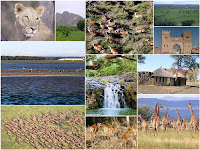The Mosquito: the deadliest creature to Man
Tiny. Weighing about 2.5mg. They have long legs and a pair of scaled wings. And they are, so far - apart from our fellow humans - the deadliest creatures to us. Mosquitoes. They cause malaria, dengue fever and the West Nile Virus. And even with all the facts that we have, each year, they kill hundreds of thousands of people. Especially in sub-Saharan Africa.
We can fight back, but the mosquito, the Anopheles mosquito in particular - is winning in Africa. And the cost, both material and human, has been high. Too high:
For Africa to win and overcome mosquitoes, not only does it need the billions of Dollars that are now being spent to fight the tiny creatures. Africa needs efficient, good, honest, transparent leaders and governments. Leaders and governments who truly care for the welfare, the well being and the needs of their people. Fighting malaria means not only fighting mosquitoes; it means too, fighting for democracy and justice in Africa.
We can fight back, but the mosquito, the Anopheles mosquito in particular - is winning in Africa. And the cost, both material and human, has been high. Too high:
The vast majority of malaria deaths occur in Africa, south of the Sahara, where malaria also presents major obstacles to social and economic development. Malaria has been estimated to cost Africa more than US$ 12 billion every year in lost GDP, even though it could be controlled for a fraction of that sum.
There are at least 300 million acute cases of malaria each year globally, resulting in more than a million deaths. Around 90% of these deaths occur in Africa, mostly in young children. Malaria is Africa's leading cause of under-five mortality (20%) and constitutes 10% of the continent's overall disease burden. It accounts for 40% of public health expenditure, 30-50% of inpatient admissions, and up to 50% of outpatient visits in areas with high malaria transmission.
There are several reasons why Africa bears an overwhelming proportion of the malaria burden. Most malaria infections in Africa south of the Sahara are caused by Plasmodium falciparum, the most severe and life-threatening form of the disease. This region is also home to the most efficient, and therefore deadly, species of the mosquitoes which transmit the disease. Moreover, many countries in Africa lacked the infrastructures and resources necessary to mount sustainable campaigns against malaria and as a result few benefited from historical efforts to eradicate malaria.
In In Africa today, malaria is understood to be both a disease of poverty and a cause of poverty. Annual economic growth in countries with high malaria transmission has historically been lower than in countries without malaria. Economists believe that malaria is responsible for a growth penalty of up to 1.3%% per year in some African countries. When compounded over the years, this penalty leads to substantial differences in GDP between countries with and without malaria and severely restrains the economic growth of the entire region. Malaria also has a direct impact on Africa's human resources. Not only does malaria result in lost life and lost productivity due to illness and premature death, but malaria also hampers children's schooling and social development through both absenteeism and permanent neurological and other damage associated with severe episodes of the disease. RBM
For Africa to win and overcome mosquitoes, not only does it need the billions of Dollars that are now being spent to fight the tiny creatures. Africa needs efficient, good, honest, transparent leaders and governments. Leaders and governments who truly care for the welfare, the well being and the needs of their people. Fighting malaria means not only fighting mosquitoes; it means too, fighting for democracy and justice in Africa.


